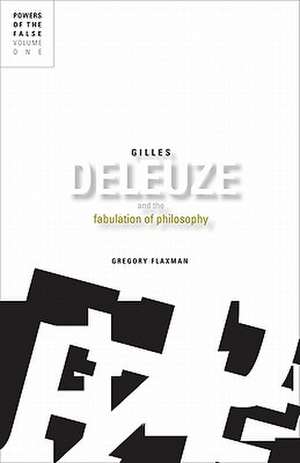Gilles Deleuze and the Fabulation of Philosophy: Powers of the False, Volume 1
Autor Gregory Flaxmanen Limba Engleză Paperback – 20 dec 2011
Although much has been written about Deleuze’s engagement with the arts, Gilles Deleuze and the Fabulation of Philosophy concerns the art of his philosophy. Gregory Flaxman suggests that Deleuze’s notorious rejection of representation gives rise to a singular task—to create new concepts and invent new means of philosophical expression. Tracing this task throughout Deleuze’s vast oeuvre, Flaxman argues that Deleuze’s ambition to think and write “otherwise” constitutes the fabulation of philosophy itself.
For Flaxman, Deleuze’s philosophy is organized around the notion of the friend (philos). This book dramatizes the practice of friendship in Deleuze’s intimate affairs with philosophers—including Plato, Aristotle, Spinoza, Kant, and Foucault—and close encounters with a range of writers, including Homer, More, Kafka, Woolf, and Borges. Flaxman traces Deleuze’s relationship with Nietzsche, the friend from whom he learned to write “in his own name,” to explain how apprenticeship becomes the initial condition of Deleuze’s philosophical method. Detailing the transformation of Nietzsche’s genealogy into “geophilosophy,” Flaxman goes on to show how Deleuze’s philosophy of the earth precipitates his return to ancient Greece and induces his resolution to overturn Platonism. In this spirit, the book demonstrates Deleuze’s evocation of the “powers of the false” by examining how, in his battle against representation, he makes fiction the basis for a minor philosophy. This first volume draws to a close with a timely elaboration of Deleuze’s avowed, if enigmatic, “style as politics” in an age when capitalism and communication challenge the claims of philosophy as never before.
A stunning and original contribution, Flaxman’s book restores the question of aesthetics to Deleuze’s thinking and writing. Gilles Deleuze and the Fabulation of Philosophy not only revitalizes our sense of the philosopher but revises the sense of his philosophy, provoking critical problems and novel possibilities with which readers will wrestle for years to come.
For Flaxman, Deleuze’s philosophy is organized around the notion of the friend (philos). This book dramatizes the practice of friendship in Deleuze’s intimate affairs with philosophers—including Plato, Aristotle, Spinoza, Kant, and Foucault—and close encounters with a range of writers, including Homer, More, Kafka, Woolf, and Borges. Flaxman traces Deleuze’s relationship with Nietzsche, the friend from whom he learned to write “in his own name,” to explain how apprenticeship becomes the initial condition of Deleuze’s philosophical method. Detailing the transformation of Nietzsche’s genealogy into “geophilosophy,” Flaxman goes on to show how Deleuze’s philosophy of the earth precipitates his return to ancient Greece and induces his resolution to overturn Platonism. In this spirit, the book demonstrates Deleuze’s evocation of the “powers of the false” by examining how, in his battle against representation, he makes fiction the basis for a minor philosophy. This first volume draws to a close with a timely elaboration of Deleuze’s avowed, if enigmatic, “style as politics” in an age when capitalism and communication challenge the claims of philosophy as never before.
A stunning and original contribution, Flaxman’s book restores the question of aesthetics to Deleuze’s thinking and writing. Gilles Deleuze and the Fabulation of Philosophy not only revitalizes our sense of the philosopher but revises the sense of his philosophy, provoking critical problems and novel possibilities with which readers will wrestle for years to come.
Preț: 223.11 lei
Nou
Puncte Express: 335
Preț estimativ în valută:
42.69€ • 45.65$ • 35.60£
42.69€ • 45.65$ • 35.60£
Carte tipărită la comandă
Livrare economică 17 aprilie-01 mai
Preluare comenzi: 021 569.72.76
Specificații
ISBN-13: 9780816665501
ISBN-10: 0816665508
Pagini: 432
Ilustrații: 4 b&w illustrations
Dimensiuni: 140 x 216 x 25 mm
Greutate: 0.48 kg
Ediția:1
Editura: University of Minnesota Press
Colecția Univ Of Minnesota Press
ISBN-10: 0816665508
Pagini: 432
Ilustrații: 4 b&w illustrations
Dimensiuni: 140 x 216 x 25 mm
Greutate: 0.48 kg
Ediția:1
Editura: University of Minnesota Press
Colecția Univ Of Minnesota Press
Notă biografică
Gregory Flaxman is associate professor of English and comparative literature and an adjunct professor of communications at the University of North Carolina, Chapel Hill. He is the editor of The Brain Is the Screen: Deleuze and the Philosophy of Cinema (Minnesota, 2000).
Cuprins
Contents
Abbreviations
Preface: The False to the Power of Two
Introduction: The Elements of Style
1. Friendship and Philosophy, Nietzsche and Deleuze
2. From Genealogy to Geophilosophy
3. Deleuze among the Sophists
4. The Philosophy of Fiction and the Fiction of Philosophy
5. Philosophy in an Inhospitable Age
Coda: Sci-Phi
Acknowledgments
Notes
Index
Abbreviations
Preface: The False to the Power of Two
Introduction: The Elements of Style
1. Friendship and Philosophy, Nietzsche and Deleuze
2. From Genealogy to Geophilosophy
3. Deleuze among the Sophists
4. The Philosophy of Fiction and the Fiction of Philosophy
5. Philosophy in an Inhospitable Age
Coda: Sci-Phi
Acknowledgments
Notes
Index
Recenzii
"This book is a tour de force through Deleuze’s itinerary, with and without Guattari, and it is singularly Deleuzean in form as well as expression: which is to say that Gregory Flaxman’s method of ‘interpretation’ is in fact the style of philosophical interpretation ‘invented’ by Deleuze himself, and one that has under-explored ties to fabulation, the powers of the false." —Jeffrey T. Nealon, Penn State University
"Deleuze once defined the task of philosophy as requiring ‘someone—if only one—with the necessary modesty of not managing to know what everyone knows.’ Gilles Deleuze and the Fabulation of Philosophy returns us to Deleuze as the contemporary thinker who, more than any other, takes up that task. In lucid and yet forceful prose, Gregory Flaxman recalls and places before us the Deleuze of invention, the Deleuze who harnesses the resources of the false in order to create anew. Rather than simply repeating what Deleuze says, this powerful work invites us to enter the world of experimentation that Deleuze ceaselessly makes his own." —Todd May, Clemson University
Descriere
A surprising—and wide-ranging—reconsideration of Deleuze
